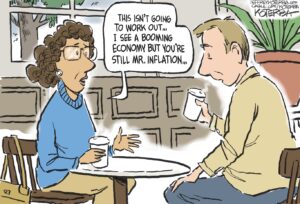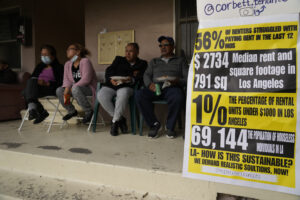Fiction, Fantasy and the Euro
The extent to which the economic policy of nations is made on the basis of misinformation or wishful thinking is not generally recognized.
The American rating firm Standard & Poor’s warned 15 European nations on Monday, including Germany and France, that unless they solve their currency problems this week, to the satisfaction of S&P, a business corporation, this company will “downgrade” them, with the effect of increasing the interest they must pay on their sovereign debt and on foreign funds placed on loan to their economies.
S&P, like the other rating firms at work today, is a company operating to make profits for its managers and stockholders. It has no public mandate, and indeed, if it acted under an assumed public-interest mandate, it could find itself sued by its stockholders, whose interest is to profit themselves, not the public.
These “ratings” of companies and nations lack any objective authority or validated qualification. The company sells opinion (like journalists; but nations and central banks very sensibly do not base their decisions on what journalists write). The potential link of unqualified or biased ratings to market speculation is obvious, but nonetheless accepted on the international markets, despite proven instances of past rating agency malfeasance, including the AAA-rated securitized junk mortgages responsible for creating this world financial crisis.
The extent to which the economic policy of nations is made on the basis of misinformation or wishful thinking is not generally recognized. Even when error becomes established as part of the conventional wisdom, it rarely is challenged because of the price usually inflicted upon public dissenters.
Consider how many years Anglo-American corporate and academic economics operated on the transparently implausible assumption that markets are perfectly informed and automatically self-correcting.
Consider the present all but universal policy of imposing austerity on nations, automatically creating unemployment and depressing consumption, making impossible the growth without which the victim nation can never pay its debts.
Consider, for that matter, the assumption underlying the creation of the euro. One of the implicit conclusions reached Monday at the Paris meeting between Angela Merkel and Nicolas Sarkozy was that European governments of varying size and sophistication (from Greece to united Germany) have difficulty coordinating national budgets in a manner that can sustain a common currency. This was said (here and elsewhere) at the time the euro was created, but the objections were disregarded in the belief that good will and luck could carry the day.
They failed to do so, and a door has now been opened for the weak to abandon the euro, suggesting that it may survive as a somewhat less than common European currency, for fewer than 17 members. In that case, it would be a more stable currency than it could ever be for 27 EU members. Whether, or how, the euro will survive is unknowable. I personally think it will survive, but it now is in jeopardy. (It has hardly been out of jeopardy since last summer.)
The outcome will theoretically be produced by officials at conferences, but those conferences take place against background concern that the matter will actually be decided by “the markets.”
Who are the markets? A mass of honest citizens searching to place their savings where they will be secure? No. The market consists of professional traders largely indifferent as to whether the euro is “rescued” or not. They place their own bets on how official actions will affect the euro’s assessed value, and their interest is to win their bets (and bonuses). The bets really are on what the majority opinion among speculators will prove to be, thereby causing the euro to rise or fall in value (for a time). This is not a matter of indifference since it causes the sovereign debt of the euro-using nations to rise or fall.
Here lies the problem. As currency possesses real rather than fiat value in the minds of those who use it to buy other things possessing intrinsic value, the outcome of market speculation has real consequences in national economies and for society. But for the speculator, the market provides a horserace, with no redeeming social value. A horserace improves the breed.
Why do governments allow speculation to set the value of their money, as they have since the last trace of the gold standard was destroyed by Richard Nixon in 1971? One notes that President Nixon was acting in tacit submission to the perils of fiat currency, since his motive (one of them) was to halt American gold holdings being shipped to France, at the demand of President Charles de Gaulle, to settle the American commercial deficit. (Had he not broken the dollar-gold link, one shivers at what American-Chinese relations would be today, with China able to demand redemption in gold of its dollar holdings. On the other hand, what peril now may exist to both countries in the lack of what might be called an objective corollary to printed money?)
Fiction and fantasy in finance provide questions that might profitably be the subject of another of those “summit conferences” that have kept high officials on the road in past months. It might be devoted to rescuing the economy from the depredations of speculation, which just last week created a situation in which, as Jeremy Warner wrote in the London Telegraph, even German bonds had lost “their ‘risk-free’ status. … No one wants to hold euro denominated assets of any variety. … All of a sudden, the pound is the European default asset of choice.”
Visit William Pfaff’s website for more on his latest book, “The Irony of Manifest Destiny: The Tragedy of America’s Foreign Policy” (Walker & Co., $25), at www.williampfaff.com.
© 2011 Tribune Media Services, Inc.
Your support matters…Independent journalism is under threat and overshadowed by heavily funded mainstream media.
You can help level the playing field. Become a member.
Your tax-deductible contribution keeps us digging beneath the headlines to give you thought-provoking, investigative reporting and analysis that unearths what's really happening- without compromise.
Give today to support our courageous, independent journalists.






You need to be a supporter to comment.
There are currently no responses to this article.
Be the first to respond.